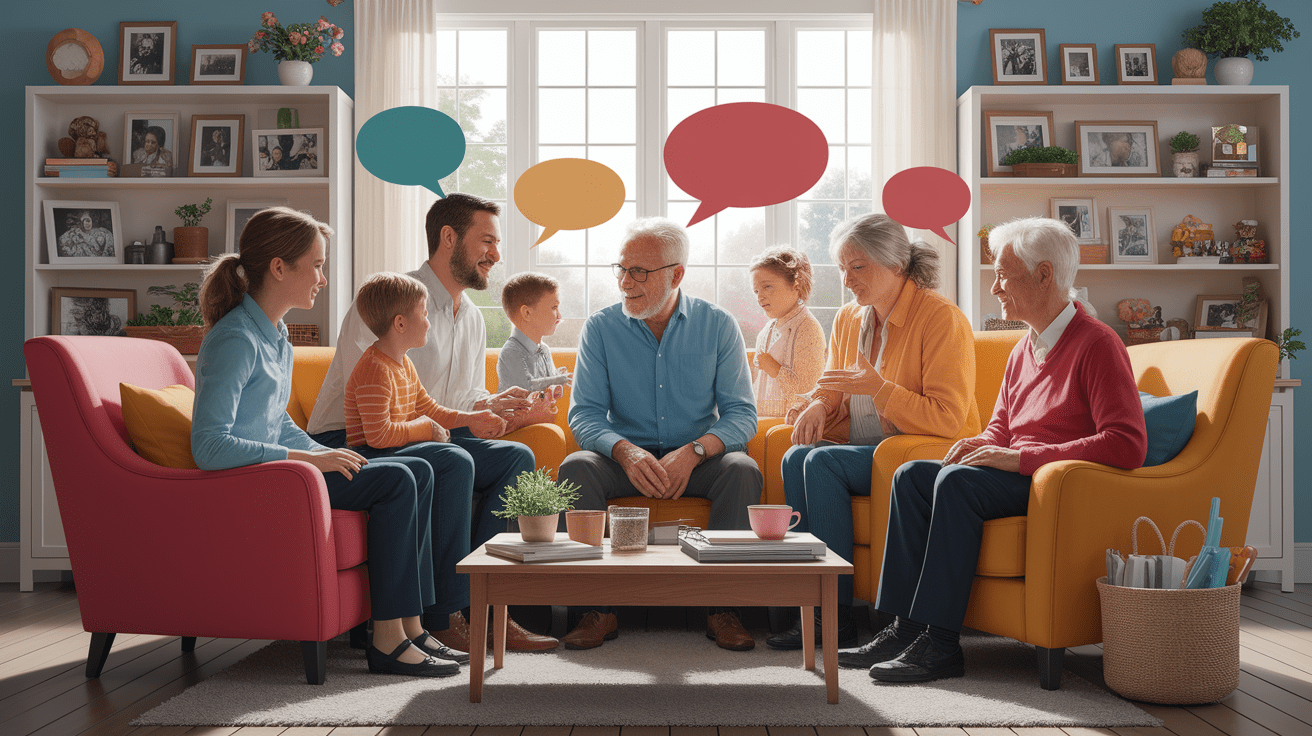Bridging the Generational Divide: A Psychological Guide to Intergenerational Communication
Opening the Conversation: Why Generational Psychology Matters
Intergenerational communication—defined as interactions between individuals from different generations—occurs within families, communities, workplaces, and broader societal contexts. According to developmental communication research, these exchanges reflect differing life stages, experiences, and social roles. Generational psychology examines how these differences influence communication styles, expectations, and interpersonal dynamics.

Understanding the psychology behind such interactions is critical to reducing miscommunication, enhancing cooperation, and fostering inclusive environments. Whether between parents and children or among Baby Boomers, Generation X, Millennials, and Generation Z colleagues, generational differences shape dialogue in ways that influence relationships, productivity, and social harmony.
Psychological Foundations of Intergenerational Communication
Generational communication patterns can be explained by several psychological theories and concepts:

- Developmental Psychology: Recognizes that cognitive and emotional developmental stages affect communication goals and styles. For example, younger individuals may prioritize exploratory dialogue, while older individuals may value reflective and experience-based communication.
- Social Identity Theory: Suggests that generational identity shapes self-concept and interaction norms. Cohort membership influences perceived in-group and out-group dynamics, affecting openness and trust.
- Communication Accommodation Theory: Describes how speakers adjust their communication behavior to converge with or diverge from their conversational partner, often shaped by generational norms and expectations.
- Generational Cohort Effects: Historical and cultural events experienced during formative years impact attitudes, values, and communication preferences, contributing to age-specific styles.
By understanding these foundations, stakeholders can better navigate cross-generational dialogue and adapt communication approaches accordingly.
Common Challenges and Misunderstandings
Barriers to effective intergenerational communication often emerge from differences in language use, communication media, and value systems. Research on miscommunication potentials points to several recurring issues:

- Generational Stereotypes: As noted in studies on perceived age stereotyping, assumptions about cognitive or emotional capabilities based on age can hinder mutual respect and openness.
- Technological Fluency Differences: Older generations may favor face-to-face or telephone communication, whereas younger cohorts often rely on digital messaging and social media.
- Contrasting Communication Goals: Younger individuals may seek fast-paced information exchange, while older individuals prefer more detailed, context-rich conversation.
- Cultural Variations: In certain societies, hierarchical respect norms strongly influence communication tone and frequency between age groups.
Without active awareness, these differences can escalate into generational conflicts, leading to decreased communication satisfaction and interpersonal connection.
Practical Strategies for Effective Dialogue
Improving cross-generational understanding requires deliberate and evidence-based strategies:

- Active Listening: Prioritize both verbal and non-verbal attentiveness to clarify intent and meaning.
- Adaptation of Communication Channels: Choose mediums that align with the preferences of the target generation to ensure comfort and clarity.
- Shared Reference Points: Use examples and language relatable to all participants to bridge comprehension gaps.
- Empathy Training: Incorporate exercises that foster perspective-taking from different generational viewpoints.
- Intergenerational Mentoring: Facilitate environments for mutual learning, where technological skills or life experience can be exchanged.
Such interventions reflect a growing recognition of the need for tailored communication competence development across age-diverse groups.
Applying Insights Across Contexts
Intergenerational communication principles can be applied in multiple domains, enhancing both relationships and performance. In the workplace, multigenerational team research emphasizes aligning communication styles with generational preferences to reduce misunderstandings. Specific approaches include:

- Employee Training: Programs designed to recognize and adapt to generational values and communication patterns.
- Inclusive Policy Design: Accommodating flexible communication options, such as open-door policies alongside virtual collaboration tools.
- Cross-Age Project Planning: Leveraging the distinct strengths of Baby Boomers, Generation X, Millennials, and Generation Z for innovative outcomes.
Beyond workplaces, community-based initiatives such as intergenerational interventions demonstrate measurable benefits for mental health, social inclusion, and reduction in generational prejudice.
Cultivating Mutual Understanding: A Path Forward
Building sustainable cross-generational understanding involves cultivating respectful, adaptive, and empathetic communication practices. Evidence from intergenerational relationship research highlights how structured engagement programs and open dialogue opportunities lead to mutual respect and reduced age-based bias.
By combining psychological insight with practical strategies, individuals and organizations can overcome communication barriers tied to generational differences. The path forward requires not only recognizing the diversity of communication styles and preferences but also integrating those differences into mutually enriching interactions that strengthen both personal and collective wellbeing.







